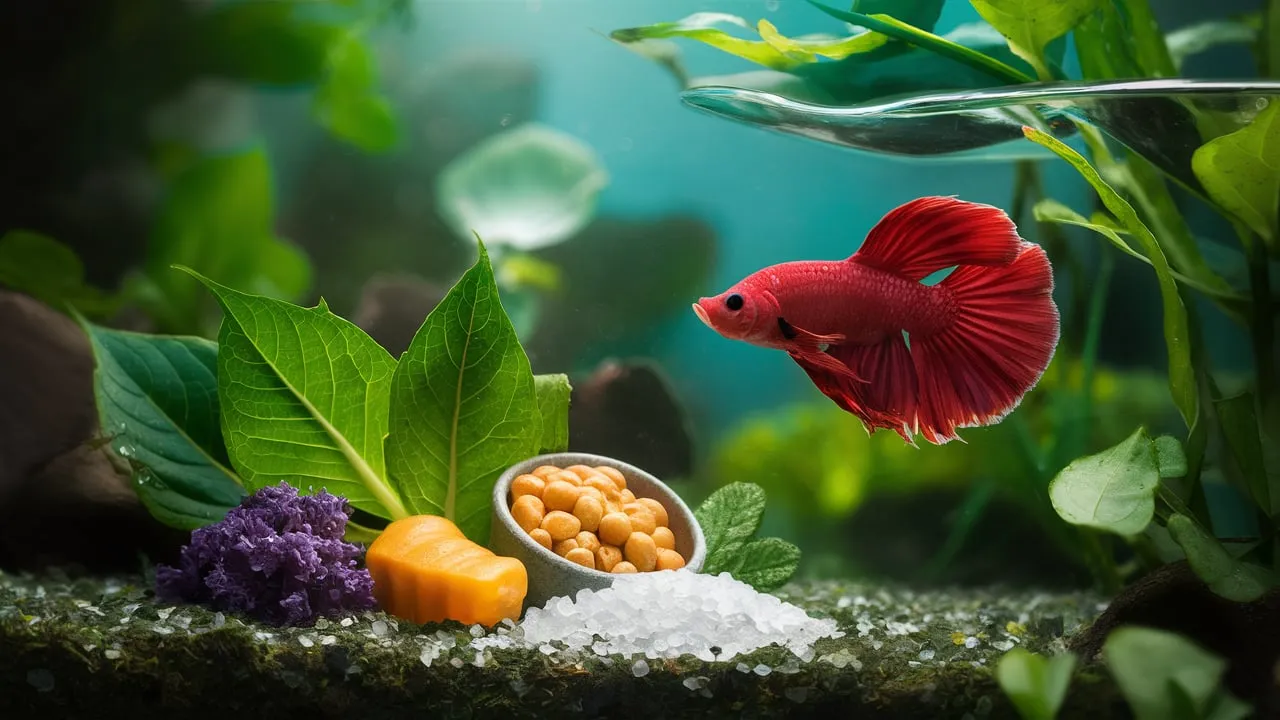How To Treat Betta Fish Constipation? Constipation in betta fish is a common issue that, if left untreated, can lead to serious health problems.
In this comprehensive guide, Betta Fish Guide will dive into the causes, symptoms, and most importantly, the effective treatments for betta fish constipation.
Identifying the Causes of Constipation in Betta Fish
Understanding the root causes of constipation in betta fish is essential for both prevention and treatment. Here are some common culprits:
Diet and Feeding Practices
- Overfeeding: One of the most frequent causes of betta constipation is overfeeding. Bettas have small stomachs, and feeding them more than they can digest can lead to digestive upset.
- Low-Quality Food: Feeding your betta low-quality or expired food can also contribute to constipation. Look for high-quality betta pellets or flakes that list whole protein sources as the primary ingredients.
- Lack of Fiber: A diet lacking in fiber can slow down digestion and contribute to constipation.
Environmental Factors
- Stress: Stress from factors like poor water quality, inadequate tank size, or aggressive tank mates can negatively impact a betta’s overall health, including their digestion.
- Temperature Fluctuations: Bettas are tropical fish and prefer stable water temperatures. Sudden changes in temperature can disrupt their metabolism and lead to constipation.
Underlying Health Conditions
In some cases, betta fish constipation can be a symptom of an underlying health condition, such as:
- Swim Bladder Disorder: This condition affects a fish’s buoyancy and can sometimes lead to constipation.
- Internal Parasites: Parasites can interfere with a betta’s digestive system and cause constipation.
Recognizing the Symptoms of Betta Constipation
Early detection is crucial when it comes to treating betta constipation. Look out for the following symptoms in your betta:
- Swollen Abdomen: A bloated or distended belly is a telltale sign of constipation.
- Reduced Appetite or Refusal to Eat: Constipated bettas may show a decreased interest in food.
- Difficulty Swimming: A constipated betta may have trouble swimming normally, often struggling to stay upright or sinking to the bottom of the tank.
- Lack of Defecation or Stringy Feces: An absence of feces or the presence of long, stringy feces trailing from the betta are clear indicators of constipation.
- Lethargy: Constipated bettas often become lethargic and inactive.

How To Treat Betta Fish Constipation? Effective Treatments
If you suspect your betta fish is constipated, it’s important to act quickly. Here are some effective betta constipation treatments:
Fasting
Fasting is often the first line of treatment for constipated betta fish.
- Why it Works: Fasting gives your betta’s digestive system a chance to rest and process any undigested food.
- How to Do It: Refrain from feeding your betta for 1-2 days. Observe for any improvement in their symptoms.
Epsom Salt Baths
Epsom salt baths can help relieve constipation by drawing out excess water and reducing bloating.
- Why it Works: Epsom salt (magnesium sulfate) acts as a laxative and can help stimulate bowel movements.
- How to Do It:
- Prepare a separate hospital tank with clean, dechlorinated water. Match the temperature to the betta’s main tank.
- Dissolve 1-2 teaspoons of Epsom salt per gallon of water in the hospital tank.
- Acclimate your betta to the hospital tank slowly by gradually introducing small amounts of the Epsom salt
- water into their container over 15-20 minutes.
- Observe your betta closely during the bath. Limit the bath to 15-20 minutes.
- After the bath, gently net your betta and return them to their main tank.
Daphnia or Brine Shrimp
Daphnia and brine shrimp are natural laxatives that can help get your betta’s digestive system moving again.
- Why it Works: These tiny crustaceans are high in fiber and moisture, which can aid in digestion.
- How to Do It:
- Feed your betta a small amount of live or frozen daphnia or brine shrimp once a day.
- Avoid overfeeding, as this can worsen constipation.

Pea Treatment
Feeding your betta a small amount of cooked, deshelled pea is a popular home remedy for constipation.
- Why it Works: Peas are a good source of fiber and can help bulk up your betta’s stool, making it easier to pass.
- How to Do It:
- Cook a small amount of frozen or fresh peas until soft.
- Remove the skin and mash the pea into a paste.
- Feed your betta a small amount of the pea paste. Avoid overfeeding.
Consulting a Veterinarian
If your betta’s constipation doesn’t improve after trying home remedies or if their symptoms worsen, it’s crucial to consult a qualified aquatic veterinarian.
- Why it’s Important: A veterinarian can properly diagnose the underlying cause of your betta’s constipation and recommend appropriate treatment, which may include medication or other interventions.
Preventing Constipation in Betta Fish
Prevention is always better than cure. Here are some tips to help prevent betta constipation:
- Feed High-Quality Food: Choose high-quality betta pellets or flakes that list whole protein sources as the primary ingredients.
- Avoid Overfeeding: Feed your betta only what they can consume in 2-3 minutes, once or twice a day.
- Soak Pellets: Soaking betta pellets in tank water for a few minutes before feeding can help soften them and make them easier to digest.
- Offer Variety: Supplement your betta’s diet with occasional treats like daphnia, brine shrimp, or bloodworms.
- Maintain Clean Water: Perform regular water changes and use a reliable aquarium filter to maintain good water quality.
- Provide a Stress-Free Environment: Ensure your betta’s tank is appropriately sized, decorated, and free from aggressive tank mates.
Conclusion
Betta fish constipation is a common problem that can usually be resolved with prompt and proper care. By understanding the causes, symptoms, and treatments outlined in this guide, you can help keep your betta fish healthy and thriving.
Remember that early detection and intervention are key to a successful outcome. If you have any concerns about your betta’s health, don’t hesitate to consult a qualified aquatic veterinarian.

Related Posts
Culture Of Infusoria In The Tank: A Microscopic Feast for Fry
Almond Leaf For Betta: A Natural Habitat Enhancer
Clamped Fins On Betta: Causes & Treatment